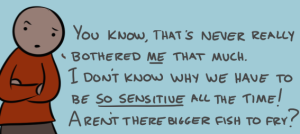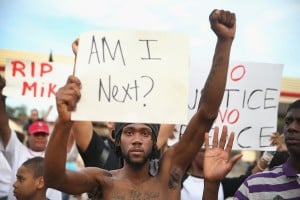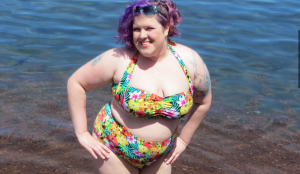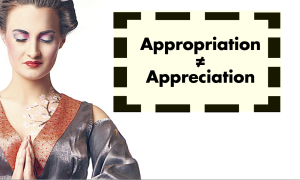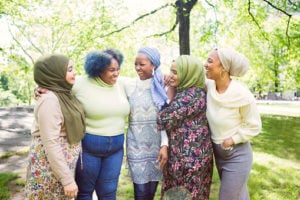
A group of Muslims smile and talk.
I once was at the United Nations for a conference when one of the white attendees got up and declared that she was organizing a conference on abuse against Muslim and Arab women (they’re not the same thing, but who cares?).
She went on and on about how there is no platform for them to talk about the violence they experience — she felt it is was important that she organize something around it.
After the event, I made my way to her. I introduced myself and told her I was interested in learning about the conference and the speakers she has lined up.
I asked her if she had reached out to any women-run organizations in the Middle East or the Muslim world. Her answer was simple: “No, I’m not aware of any. I don’t think they’re mobilized enough.”
I wish I was speechless but, when you grow up watching TV and seeing people who don’t look like you constantly speaking about your experiences, it becomes the norm.
I casually threw some names out to her but she didn’t bother to write them down. I didn’t bother to follow up with her.
This was never meant for us, and we didn’t need her conference to uplift our voices (or the voices of those who don’t look like us but still speak for us).
This conversation led me to delving deeper into the women who mobilize everyday to create change in their communities. The ones who sometimes go unrecognized by Western feminists because they do not fit the oppressed weak image of a Muslim woman.
So now, let me share with you women who were amazing at leading movements, mobilized, and led change in their spaces.
I share this with you to extend to you an invitation into the worlds in which we already operate in. they have existed for centuries, working tirelessly, to find justice in the most courageous of ways.
1. Hind Makki
What started as a personal frustration at the limited spaces for women to pray at mosques, Hind Makki started a Tumblr and Facebook page documenting the differences spaces provided for women in mosques across the world.
This conversation has been happening for years, where Muslim women were growing frustrated at how tiny, unclean, and inaccessible the rooms and spaces provided for women mosque-goers are.
Her idea was to show the disparity between sections and sometimes, the beauty of some spaces who get it right. This project receives hundreds of submissions from around the world of women sending in their mosque experiences.
Hind started the project in 2012 after her friend was nearly kicked out of her mosque after being berated for daring to pray in the male prayer area because the designated women’s section was a hot, moldy basement.
“It is my optimistic belief that as more people see photos of the spaces women must pray in, and hear our stories, we will gain more male allies who will collaborate with us to improve the situation,” Hind states on her Tumblr.
Read more about Hind’s movement and project here.
2. Hidayet Tuksal
Turkish feminist theologist, Hidayet Tuksal, offers a unique and empowered perspective in today’s polarized Turkey.
Prompted by the misogyny of her male colleagues in school, Tuksal began to study Islamic theology as a way to combat the religious sexist speech and to liberate the religious text from the readings of the male gaze.
Tuksal has faced harsh criticism from both the left wing feminists and the right. Wearing a headscarf in a time where ultra-secular Turkey had banned it in universities and public offices, Tuksal was a walking paradox.
In a country where you are either a headscarf-wearing, docile, ultra-orthodox Muslim woman or a staunch secular opposing the headscarf, Tuksal created a public space for an alternative.
A space for women who found themselves in Islam and were liberated in its text and practices.
“There is no single feminism, just as there is no single Islam,” Tuskal stated in an interview.
“Given this diversity, I can say I feel close to feminism based on the common denominator of rejecting and fighting mentalities that view the male as the essential human being and secondarize the female”.
3. Asma Lamrabet
A physician by profession, Moroccan feminist Asma worked as a doctor in Central America where she was exposed to Liberation Theology that helped her revisit understandings of liberation in her religion, Islam.
Liberation Theology is derived from the practice inspired in Christian movements in Latin America that prioritize the liberation and justice for the oppressed and derives religious understanding from this foundation.
Lamrabet focuses on discussing certain practices, such as the hijab, through a Western colonialist context. She also looks at the ways the Quran has been historically interpreted to uphold patriarchy due to cultural and political realities of certain times.
Lamrabet places emphasis on the violent history of Western colonialism and imperialism as a factor in the current gender and socio-political inequity found in many parts of the Muslim world.
In her rejection of Western feminism, Lamrabet states a belief that all women are in the same struggle against hegemonic patriarchy without any historical or geographical context. She attempts to dispel the idea that women are all unified unanimously in a struggle against patriarchy.
She states, “Concepts such as colonization, racism or slavery, are all absent in the hegemonic feminist thought, and as south feminists or “marginalized” feminists, we must have our own experience that allows us to develop our own strategy of resistance and mobilization.”
She considers herself a ‘third-way’ feminist. She describes a third way feminist as one that rejects the two sides presented currently in the mainstream understanding of gender practices: Western feminism and religious conservatism.
Her third-way belief finds her liberation through the rereading of the religious text away from patriarchal and Western influenced understandings of Islam.
Lamrabet has written five books about Islamic feminism and they are absolutely powerful, recommended reads!
4. Zainah Anwar
A Malaysian feminist, Zainah founded a civil society organization called Sisters In Islam (SIS) in Malaysia, that focused on Islamic law pertaining to women rights and Family Law in Malaysia.
Through SIS, Zainah and other Malaysian activists attempt to bring multiple visions to life. This includes creating a framework of gender rights in Islam that encompasses diverse experiences of women.
This work is joined with their long term goal of advocating, through research and public outreach, the public’s mindset around gender equality in Islam. Through public awareness, SIS hopes to be able to reform local laws to make them more gender equitable and empowering.
According to Anwar, the organization started with a question: “If God is just, if Islam is just, why do laws and policies made in the name of Islam create injustice?”
Through this question, SIS was able to bring together academics, lawyers, theologists, and activists to look into Islamic Family Law and the Quran and see what it really says about certain issues such as domestic violence, polygamy, and obedience.
Through the rereading of the text and placing it in socio-political contexts, SIS is attempting to change public perception and reform laws through constitutional grounds.
You can read a more in depth conversation with Zainah through her interview with Muslima.
5. Amina Wadud
Born into a Methodist family, Amina Wadud converted to Islam in the early 1970’s.
Holding a doctorate in Islamic Studies and Arabic from the University of Michigan, Wadud spent some time delving deeper into Islamic studies in Cairo where she studied at the historical Islamic Al Azhar University.
From there, Wadud dedicated her time in lifting the voices of women through her strong stance that patriarchy actually takes someone out of the fold of Islam.
Meaning that if you believe that men are superior to women, you are therefore contradicting the message of the Quran which advocates the equality of both men and women and directly violates the idea that we are equal under the superiority of Allah.
Through this lens, Wadud strips any patriarchal approach to Islam by taking the initiative to deliver Friday sermons to mixed congregations (a job traditionally given to men) to leading the prayers of mixed congregations.
Wadud pushes the comfort of what was never challenged, forcing everyone to have a conversation and ask themselves: what did the Quran really say? What did Prophet Muhammed actually advocate for?
This curiosity opens us up to new questions and, through this, Wadud believes we are able to come to the essence of a text that patriarchy has corrupted.
Wadud talks extensively about this process in her book, “Qurʼan and woman rereading the sacred text from a woman’s perspective.”
***
I share these great women with you in hopes that you will push yourself to explore the diverse activist history of Muslim women.
Do all these women agree with each other? Probably not. Do all Muslim women support them? I don’t think so.
What we can say is that they open up spaces for themselves and others to explore their own understandings of their faith and provide them with tools for liberation.
Every Muslim woman has a unique relationship with her religion, herself, and her womanhood and they should all be recognized and uplifted.
Any liberation that relies on the oppression of others or causes injustice must be recognized as such. These women acknowledge this and advocate courageously in order to live out this truth.
[do_widget id=’text-101′]
Hadiya Abdelrahman is an Everyday Feminism Reporting Fellow. Hadiya graduated from Rutgers University with a double major in Women and Gender studies and Middle Eastern Studies. Hadiya currently works with refugees and asylees in NYC. When she’s not at work, Hadiya writes angry rants and poetry. She enjoys writing about topics that focus on refugees, intersectional feminism, and state violence against people of color.
Search our 3000+ articles!
Read our articles about:
Our online racial justice training
Used by hundreds of universities, non-profits, and businesses.
Click to learn more






